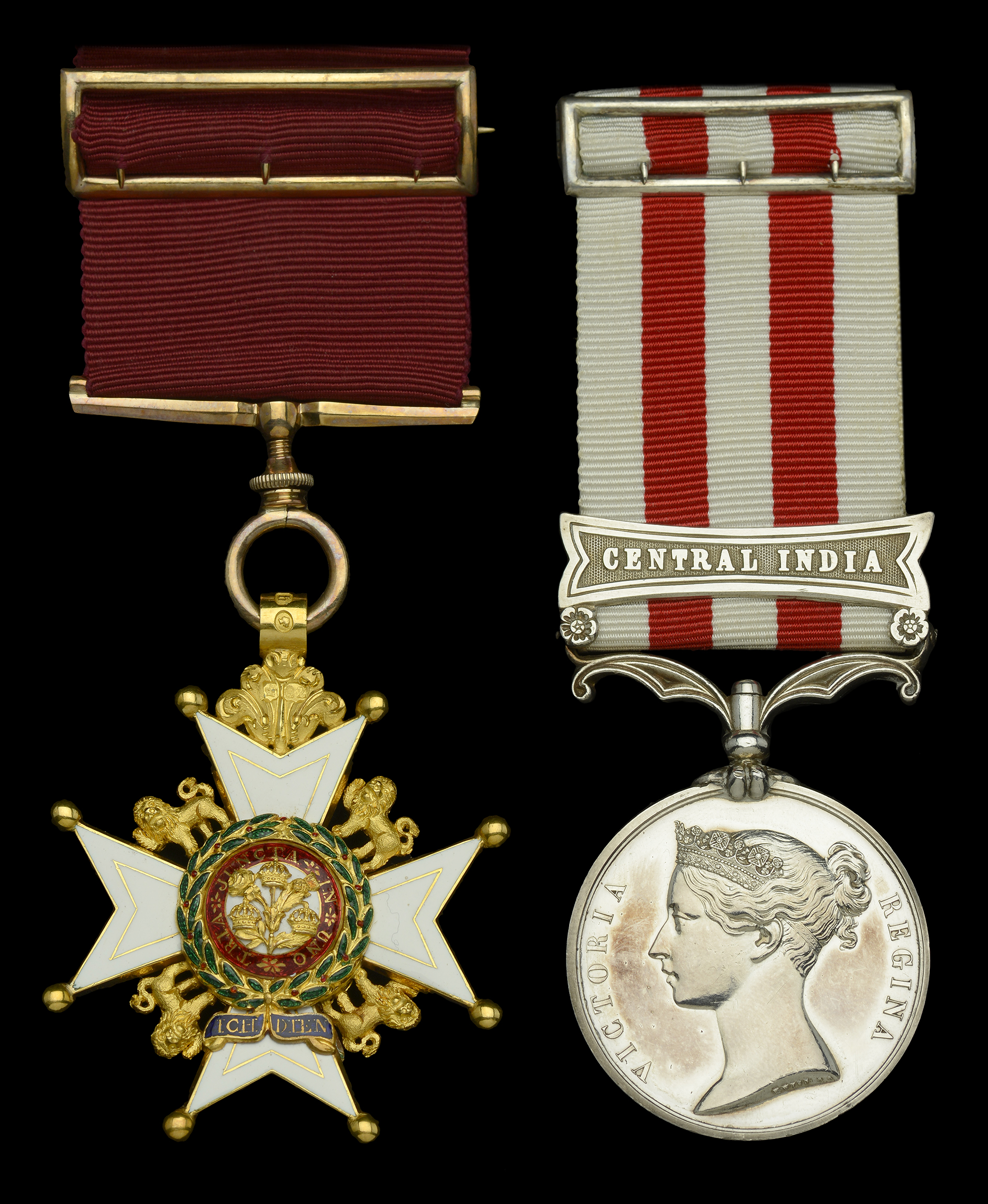An ‘Indian Mutiny’ C.B. pair awarded to General H. Macan, 17th Regiment Bombay Native Infantry and Rajpootana Field Force, who was fired upon by a rebellious mutineer in an early and fruitless show of defiance The Most Honourable Order of the Bath, C.B. (Military) Companion’s breast badge, 18ct gold and enamel, hallmarks for London 1857, with later narrow swivel-ring suspension and integral gold riband buckle; Indian Mutiny 1857-59, 1 clasp, Central India (Brigdr. Hy. Macan, Rajpootana Fd. Force) with silver top riband buckle, displayed in a fine glazed silver frame, hallmarked Birmingham 1918, extremely fine (2) £2,600-£3,000 --- C.B. London Gazette 1 March 1861. Henry Macan was born at Dhaka on 20 December 1804 and was privately educated by Mr. Howard at Tamerton on the Devon and Cornwall border, specialising in Greek, Latin, French, Mathematics and Hindustani. Orphaned at a young age, Macan was placed in the custody of his uncle, Major Thomas Macan of Bath, who proved keen to recommend him for a Cadetship in the Indian Army; thanks to his linguistic talents, Macan was appointed Ensign on 4 January 1821 and served as Interpreter in the 2nd Battalion, 9th Native Infantry from 23 May 1822. Advanced Lieutenant on 1 February 1822, Macan then transferred to the 17th Native Infantry where he qualified as Interpreter in Hindustani and Mahratta. On 23 February 1831, he was placed in command of a detachment of the Regiment employed in the concan against the Ramoosees - the concan being that part of Maharashtra located between the Ghauts and the sea, extending from Sewdasheogurh to the Taptee on the western peninsula of India. Recorded as arriving at the Presidency from Poona in the Government of India Gazette 20 October 1831, Macan was raised Captain on 27 November 1834 and Major on 17 October 1841; it was at around this time that he was appointed to act as Persian Interpreter to Major-General Brooks, Commanding the Scinde Field Force. Made President of the Annual Invaliding Committee on 17 February 1842, Macan was recognised as an ‘able and zealous’ commanding officer. Further advanced Lieutenant-Colonel on 29 December 1846 and Second Class Brigadier on 16 April 1854, his leadership qualities were soon put to the test during the Mutiny. An extract from The History of the Indian Mutiny by Kaye and Melleson (page 387), notes: ‘Slight Outbreak at Nasirabad Easily Suppressed by Brigadier Macan On 10th August 1857, the military class showed its teeth. One of the regiments accompanying the force for which Gen. G. Lawrence had made a requisition on Disa, and which had reached Nasirabad on 12th June, was the 12th Bombay N.I. A trooper of the 1st Bombay Lancers, suddenly mounting his charger, had galloped in front of the lines of his regiment, endeavouring by cries and threats to induce his comrades to mutiny. The Bombay Lancers, however, were staunch, and some of them mounted their horses to pursue the rebel. Noting this, the trooper discharged his carbine at the native officer superintending the mount, and fled to the lines of the 12th Bombay N.I. where he was received and sheltered. Meanwhile, the Brigadier, Henry Macan, had come onto the parade ground. He at once ordered the men of the 12th to turn out. Only 40 obeyed. Upon this, the Brigadier called out the guns, and bringing up a company of the 83rd, proceeded to the line of the 12th. The original mutineer, the trooper of the 1st Cavalry, fired at him but missed. The rebel himself was then shot by an artillery officer. The men of the 12th were paraded, and all who had disobeyed the order to turn out were disarmed. Their muskets were found loaded. The ringleaders were then tried by court-martial, five were hanged and three sentenced to imprisonment for life. Twenty-five had previously deserted. To the remainder, their arms, on their expression of contrition, were restored, and they behaved well in the field afterwards.’ According to the Magnet (London) on 27 April 1885, Macan went on to command 1st Brigade at the Siege, Assault and Capture of Kotah in March 1858. Permitted to resign his command at Nasirabad 1 October 1858, Macan took furlough to Europe for 18 months. Promoted Major-General on 5 March 1859, and General on 24 May 1877, he died in his 81st year on 20 April 1885.


